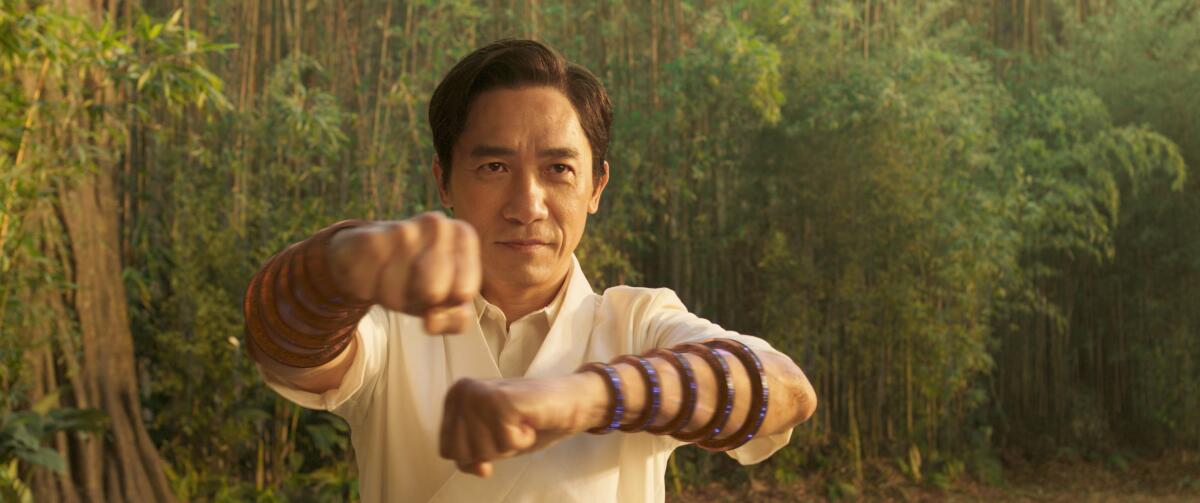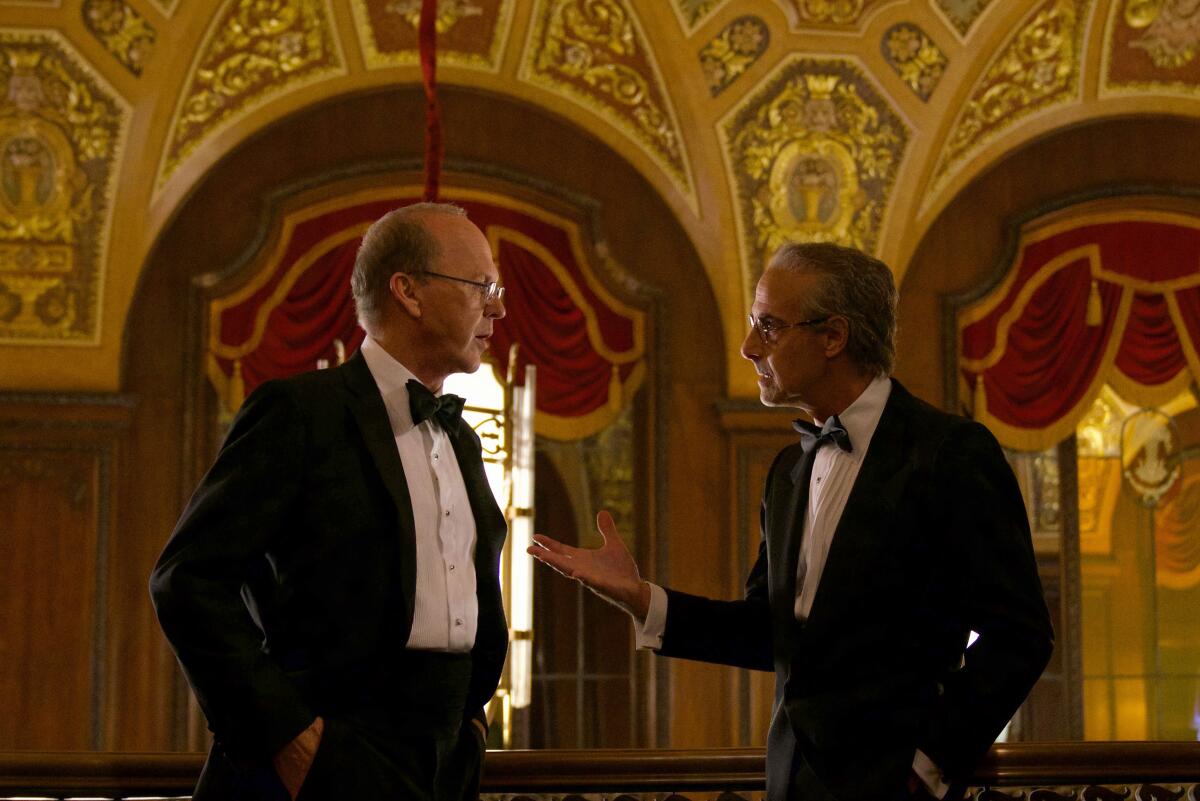Indie Focus: a new hero in ‘Shang-Chi’
- Share via
Hello! I’m Mark Olsen. Welcome to another edition of your regular field guide to a world of Only Good Movies.
Only good movies
Get the Indie Focus newsletter, Mark Olsen's weekly guide to the world of cinema.
You may occasionally receive promotional content from the Los Angeles Times.
Since our big fall preview package published last week, both the Venice and Telluride film festivals have begun, more or less officially starting the fall movie season. (And yes, awards season too.) Perhaps it’s due to the slow but steady pacing of new releases we have gotten used to, but it seems like a wild gush of new films have premiered over just the last few days. Even adjusting for the often over-inflated reactions out of festivals, the news has been very exciting indeed.
Josh Rottenberg wrote about the Telluride lineup, which includes Pablo Larraín’s “Spencer,” Jane Campion’s “Power of the Dog,” Mike Mills’ “C’mon C’mon” and more films expected to be awards season contenders.
On having an in-person festival at a time when so much of the country is continuing to struggle with COVID, Executive Director Julie Huntsinger said: “I don’t want it to be an anxious gathering, but at the same time, we’re not going to be letting our hair down, like, ‘Woo! Let’s go to a party in a tiny space and sweat and dance.’ I want excitement and I want buzz. But we’re not going to reach euphoria. Maybe this time there will be an internal personal euphoria.”
Glenn Whipp wrote about the Telluride premiere of “King Richard,” in which Will Smith stars as Richard Williams, father of tennis superstars Venus and Serena Williams. In addition to featuring an end-credits song by Beyoncé, Glenn noted about the film, “Smith is 52 and, sporting grey-flecked stubble, we’ve never seen him this far from Fresh Prince freshness. The movie harnesses his charisma to fine effect, channeling it into Richard’s stubborn, ego-driven episodes and adding lighter, equally insightful touches too, as when dad calls for a family meeting, shows his girls the 1950 Disney animated version of ‘Cinderella’ and then asks them to tell him what they learned. None of them came up with his takeaway — stay humble — so he threatened to show it again.”
From Telluride, Justin Chang wrote about Mike Mills’ “C’mon C’mon,” Michael Pearce’s “Encounter” and Asghar Farhadi’s “A Hero,” noting: “All this was especially strange and surreal to ponder while sitting, double-masked, in a crowded but not overflowing theater at Telluride — the first film festival I’ve attended in person since the onset of the pandemic, which means it’s also the first time I’ve really been away from home in 18 months. Doubtless speaking for many of us who decided to make the trip, it’s a delight to be back here in this beautiful former mining town, breathing in the fresh mountain air and taking in some hopefully excellent new movies. It’s especially meaningful to be back after the pandemic forced Telluride to cancel its 2020 edition, a blow to the few thousand movie lovers for whom this Labor Day weekend event is a cherished annual highlight. ... After months of social drought, to be suddenly confronted with the long-unseen faces of friends and colleagues has been both a cause for gratitude and a source of disorientation.”
Justin also wrote about Denis Villeneuve’s adaptation of “Dune,” which premiered at the Venice Film Festival. Calling the film “magisterially brooding,” he also wrote: “Conventional wisdom has long held that ‘Dune is unfilmable,’ that its interlocking parables of colonial oppression, ecological disaster and messianic deliverance are too vast to be contained within the flattening parameters of the cinema screen. … ‘Dune: Part One,’ as it’s billed onscreen, is the first in a projected two-part adaptation, which means that any assessment of Villeneuve’s achievement must be provisional at best. For now, it’s hard to deny the excitement of feeling swept up in this movie’s great squalls of sand, spice and interplanetary intrigue, realized with a level of craft so overpowering in its dust-choked aridity that you may want to pull your mask up a little tighter in the theater. You may also feel a more qualified sense of admiration for Villeneuve’s efforts to preserve yet streamline the novel’s imaginative essence, to translate [Frank] Herbert’s heady conceits and arcane nomenclature into a prestige blockbuster idiom.”
I spoke to Oscar Isaac and Tiffany Haddish about their electrifying chemistry in Paul Schrader’s “The Card Counter,” which also premiered at Venice. (Isaac is also at the festival with “Dune” and the TV adaptation of Ingmar Bergman’s “Scenes from a Marriage.”)
On whether this performance feels different for her, Haddish said: “It feels very different. Because I had to learn how to be still. Working with Oscar, I was watching him in his stillness. He’s doing it right now — he’s saying a thousand things without saying anything. And I’ve always been so used to having to turn on, like turn it on. And in doing this movie, I learned that I don’t have to turn anything on. I could just be. And it’s OK.”
Enjoying this newsletter? Consider subscribing to the Los Angeles Times
Your support helps us deliver the news that matters most. Become a subscriber.
‘Shang-Chi and the Legend of the Ten Rings’
Directed by Destin Daniel Cretton, who co-wrote the screenplay along with Dave Callaham and Andrew Lanham, “Shang-Chi and the Legend of the Ten Rings” tells the origin story for another superhero in the crowded Marvel Cinematic Universe, but with a big difference and original panache. In the film, Simu Liu stars as Shang-Chi, a hero in the making trying to get out from the long shadow of his father, Xu Wenwu (international superstar Tony Leung). The film is now playing in theaters, and will be on the Disney + streaming platform in October.
Jen Yamato wrote about what it means to at last have an Asian lead in a Marvel superhero movie. As Marvel Studios President Kevin Feige said: “The importance of being able to see yourself up on that big screen with a big superhero company logo and somebody that looks like you as the title character has always been important, is more important than ever — and honestly, as a white guy, was something I took for granted. I never thought Luke Skywalker or Han Solo looked like me. But I took for granted subconsciously that they did, certainly more so than somebody who’s not a white guy.”
For The Times, Justin Chang wrote at length about how Leung’s presence pleasantly upends the movie, noting: “I may be overstating the cinephile’s case for this movie, especially since the reckless juxtaposition of words like ‘Marvel’ and ‘cinema’ has been known to start an argument or two. Nevertheless, these allusions and associations feel like the product of some shrewd dramatic calculus by the director, Destin Daniel Cretton (‘Short Term 12,’ ‘Just Mercy’), who wrote the script with Dave Callaham and Andrew Lanham. Leung’s presence gives the movie an extra-cinematic kick, a winking but resonant connection to an inexhaustible Asian canon of romantic dramas, underworld thrillers and martial-arts epics. It also provides an arresting entry point into a hero’s origin story that tries, with some success, to rise above Marvel business-as-usual.”
Sonaiya Kelley dug into the film’s post-credits scene, writing: “Equally notable is the tag that confirms that ‘The Ten Rings will return,’ rather than Shang-Chi. While a sequel has not yet been confirmed, it’s all but guaranteed that the character will be back in an upcoming Marvel film. Whether it’s another solo outing remains to be determined by how the film does at the box office.”
For Vulture, Alison Willmore wrote: “Shang-Chi may go through the movie feeling dwarfed by his father, but the movie itself feels dwarfed by its own Asian cinematic touchstones, acknowledging their achievements and influence and then turning abashedly to a post-credits scene in which a few members of the Marvel Establishment show up to remind us that this was all just part of a larger plan. ‘Shang-Chi and the Legend of the Ten Rings’ may give us the franchise’s first Asian American superhero, but what may be the most Asian American thing about it is the way it’s caught between the legacy of its forebears and a still-developing sense of self, its protagonist yanked away from that journey and enlisted as the face of the latest representational win, without ever seeming entirely decided on what he’s representing.”
For the Hollywood Reporter, Angie Han wrote: “Amid all this frantic plotting, Shang-Chi himself tends to get lost. … But he has a lifesaver in Leung, whose character, Wenwu, is the rare supervillain with a soul. Leung’s sincerity lights up the love underlying Shang-Chi’s convoluted origins and helps to ground the film’s kookier flights of fancy — and he does all this without stealing the show from under Liu’s Shang-Chi. It’s in their scenes together that ‘Shang-Chi’s’ core ideas feel most fully realized. Strip away all that glossy superhero magic, and the film reveals itself to be the achingly familiar tale of a child figuring out how to bridge the gap between his parents’ values and expectations and his own — in the same way that ‘Shang-Chi’ itself tries to remix old tropes with new perspectives. It doesn’t always succeed with flying colors. But as with a young hero still finding his footing, its valiant efforts feel worth cheering all the same”

‘Mogul Mowgli’
Directed by Bassam Tariq, who co-wrote the screenplay with star Riz Ahmed, “Mogul Mowgli” tells the story of a British Pakistani rapper in New York who returns to his family in London after he is diagnosed with a degenerative autoimmune disease. The film is playing now locally at the Nuart.
For The Times, Carlos Aguilar wrote: “From his perpetual cultural limbo, which many children of immigrants occupy, Zed formulated his rage-filled lyrics. Ahmed, not only a gifted thespian but also a rapper in real life, cowrote the screenplay. He burns through the onstage performance sequences, confirming that under the fictional veneer there’s a channeling of lived-in truth. … Embracing the character’s physical infirmity, Ahmed stuns with a performance of unguarded fragility and growing frustration, even more affecting in its heartrending rawness than his Oscar-nominated turn in ‘Sound of Metal,’ coincidentally also centering a musician on the rise whose dreams are derailed by chronic illness.”
For the New York Times, A.O. Scott wrote: “Nothing about Zed is simple, and he revels in his own complexity. ‘Mogul Mowgli,’ Bassam Tariq’s astute, compact fictional feature debut, is a portrait of the artist as a son, brother and patient. Not that he’s summed up by such roles, or any others. ‘Only a few fit those words, so I’m repping for the rest of us,’ he raps. … Tariq stitches domestic drama, satire and magical realism into a tissue of moods and meanings, held together by the shattering credibility of Ahmed’s performance. In his work, Zed tries to bring coherence to the baffling anarchy of experience. ‘Mogul Mowgli’ accomplishes just that.”
For The Playlist, Robert Daniels wrote: “While Ahmed gained plenty of plaudits for his turn in ‘Sound of Metal,’ his real-life background as a hip-hop artist feels geared, slightly better, toward Zed. Here, Ahmed further establishes himself as one of our premier leading men, a performer capable of matching the physical and the internal machinations of his characters for exacting, vulnerable portrayals. … While ‘Mogul Mowgli’ could do with a bit more story, in the waning minutes, the bare conclusion is more than enough to satisfy. Tariq’s ‘Mogul Mowgli’ is enrapturing, revelatory, and at all times, a nightmarish accounting of the bonds that make us, but can easily break us as well.”
For IndieWire, Siddhant Adlakha wrote: “Ahmed exudes a never-before-seen vulnerability, both physically and emotionally. He isn’t the feisty Ruben of ‘Sound of Metal,’ but an older man whose career and family prospects haven’t worked out, and who struggles to hide his bald spots (and eventually, his ailment). He projects aggression, but Tariq unearths his misery and the frustration he turns inward by making him look diminutive in the frame.”

‘Worth’
Directed by Sara Colangelo from a screenplay by Max Borenstein, “Worth,” is about lawyer Kenneth Feinberg (Michael Keaton), who is tasked with leading the official victim compensation fund after the attacks of Sept. 11, 2001, and deciding on the awful calculus of who gets what. Stanley Tucci, Laura Benanti and Amy Ryan all have strong supporting turns. The film is streaming now on Netflix.
For The Times, Robert Abele wrote: “It’s to ‘Worth’s’ credit that in its depiction of a couple of the families — composite characters invented by the screenwriter, but informed by the myriad lives Feinberg encountered — there are complexities no three-act message in connecting is going to solve. What we’re left with is, thankfully, sharp exchanges about loss and conscience, a director’s sincere approach to potentially melodramatic material, and in-the-moment actors like Keaton, who makes the humbling weight of adding up lives into the stuff of compellingly sober contemplation.”
Way back at Sundance in January 2020, I moderated a conversation with Colangelo, much of the film’s cast and the real Kenneth Feinberg. As Colangelo said: “There is on the surface a dryness to computing these numbers and monetizing lives. It almost seems bizarre and, dare I say, vulgar. But we’ve been doing this, whether it’s insurance companies or in other facets. There’s something to that dryness kind of colliding with the heartbreak of 9/11 and the incredible emotional reeling of families. I was really interested in that tension and that collision.”
For the New York Times, Ben Kenigsberg wrote: “Even assessing ‘Worth’ as entertainment feels fraught. Only survivors can judge whether its Hollywoodized simplifications are appropriate. … For all the ways in which it might give short shrift to the politics or policy of the fund, ‘Worth’ is uncommonly moving by the standards of biopics and certainly by the standards of movies that risk addressing 9/11 so overtly. Colangelo directs with what appears to be conscious restraint, in ways by turns calculated and powerful.”
For Variety, Amy Nicholson wrote: “In ‘Worth’s’ strongest moments, the grieving mothers, fathers, spouses, partners and children force [Feinberg] and his legal team (which also includes Shunori Ramanathan and Ato Blankson-Wood) to see them as humans, not numbers. There’s a series of painful scenes where people push their memories onto the lawyers, asking them to listen to stories, letters, even voicemails, making the lawyers recoil for their own sanity. There’s only so much misery they can hear, especially Ryan, who lets Camille wear the victims’ sadness like a heavy suit. ‘That’s the job,’ Feinberg insists. And he keeps repeating that mantra until ‘Worth’s’ fictional Feinberg — if not the real one — finds it leaves an ashy taste in his mouth.”

Only good movies
Get the Indie Focus newsletter, Mark Olsen's weekly guide to the world of cinema.
You may occasionally receive promotional content from the Los Angeles Times.




